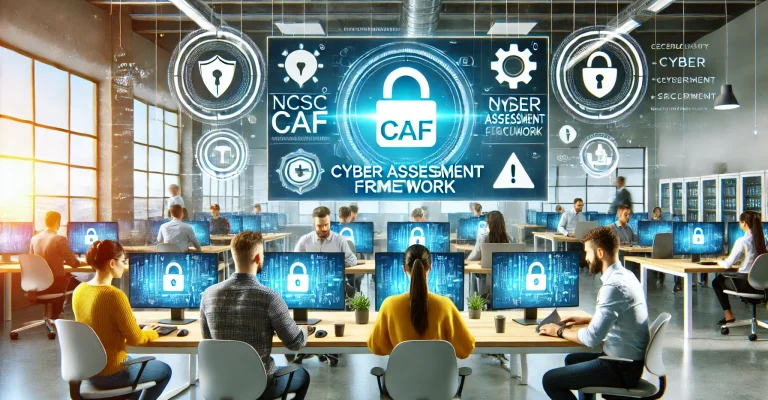Cybersecurity Career, A Comprehensive Guide for the UK
In the digital age, the significance of cybersecurity cannot be overstated. With the United Kingdom standing at the forefront of global finance, healthcare, and technological innovation, it faces unique cybersecurity challenges. These challenges, however, present a wealth of opportunities for those interested in pursuing a career in cybersecurity. This guide delves deeper into the Cybersecurity Career pathways, career opportunities, essential skills, and emerging trends in the field of cybersecurity within the UK, aiming to illuminate the path for aspiring cybersecurity professionals.
Deep Dive into Educational Pathways
Embarking on Cybersecurity Career begins with choosing the right educational path. The UK offers a range of academic and professional development options tailored to various interests and career stages.
Advanced Academic Pathways
For those looking beyond the foundation degree, Bachelor’s, or master’s degrees, doctoral programs in cybersecurity offer an opportunity to contribute to the field through research. PhD candidates can explore cutting-edge issues such as cybersecurity policy, the ethics of data privacy, or the development of new security technologies. This path is ideal for those aiming to lead in academia, research, and development.
Foundation Degree in Cybersecurity
- Duration: 2 years
- Core Subjects: Introduction to Cybersecurity Principles, Networking Fundamentals
- Career Launchpad: IT Support Analyst, Junior Security Consultant
Bachelor of Science (BSc Hons) in Cybersecurity or Computer Science
- Duration: 3 to 4 years
- Advanced Learning: Network Security, Cryptography, Ethical Hacking
- Career Pathways: Security Analyst, Network Administrator
Master’s and Doctoral Programs
- Duration: 1 to 4 years depending on the program
- Specialised Studies: Deep Dive into Cryptography, Leveraging Machine Learning for Cybersecurity
- Professional Aspirations: Cybersecurity Consultant, Academic Researcher
Specialised Certifications
In addition to the certifications mentioned, there are several other specialised certifications that cater to niche areas within cybersecurity and can bulster your Cybersecurity Career:
Certified in Cybersecurity (CC)
- Target Audience: Beginners
- Skill Focus: Security Principles, Understanding Risk, Key Concepts
- Exam Overview: 100 questions, 120 minutes
CompTIA Security+
- Target Audience: Intermediate
- Skill Focus: Security Protocols Basics, Risk Identification
- Exam Overview: 90 questions, 90 minutes
Certified Information Systems Security Professional (CISSP)
- Ideal For: Experienced professionals
- Skills Mastered: Advanced Security Management, Risk Mitigation
- Exam Format: 125-175 questions, 4 hours
Certified Ethical Hacker (CEH)
- Specialisation: Ethical Hacking Techniques
- Skill Set: Intrusion Detection, Counteracting Social Engineering
- Examination: 125 questions, 4 hours
Tailored Learning: Bootcamps and Online Courses
Cybersecurity Career bootcamps and online platforms such as Coursera, Udemy, and Cybrary offer courses designed by industry experts. These platforms provide flexibility and a wide range of topics, from introductory courses to advanced specialisations, including incident response, forensic analysis, and cybersecurity law.
Cybersecurity Bootcamps
- Duration: 3-6 months
- Experience: Practical Training, Real-world Challenges
- Outcome: Job-ready Skills
Online Courses
- Flexibility: Self-paced
- Learning Scope: Specialised Subjects like Cloud Security, Defensive Strategies
- Benefits: Skill Development, Optional Certifications
Cybersecurity Career Opportunities: From Entry-Level to Leadership
The cybersecurity field in the UK is rich with opportunities for professionals at every stage of their career. Here’s a closer look at some specific roles and their requirements:
Specialised Roles
- Cybersecurity Incident Responder: Specialists in responding to and mitigating cybersecurity incidents. Requires skills in forensic tools and understanding of the latest cybersecurity threats.
- Forensic Computer Analyst: Experts in analysing the aftermath of cyberattacks and breaches. This role involves working closely with law enforcement to track down attackers.
Leadership and Strategy
- Information Security Manager: Responsible for overseeing the security operations and strategy within organisations. This role involves both technical knowledge and leadership skills to manage teams and implement security policies effectively.
- Data Protection Officer (DPO): Essential in organisations that handle large amounts of personal data, the DPO is responsible for ensuring compliance with data protection laws and regulations.
Skills for the Future: Beyond Technical Expertise
While technical skills are the backbone of cybersecurity, the importance of soft skills cannot be overstressed. Emotional intelligence, critical thinking, and the ability to work in high-pressure situations are invaluable. Additionally, staying abreast of legal and regulatory changes, understanding the ethical implications of cybersecurity measures, and the ability to communicate effectively with stakeholders are critical.
The Evolution of Cybersecurity: Adapting to New Threats
As technology evolves, so do cybersecurity threats. The increasing reliance on artificial intelligence and machine learning in cybersecurity offers both opportunities and challenges. Cybersecurity professionals must be prepared to continually update their skills and understanding of these technologies to protect against sophisticated cyber threats.
Conclusion: Your Pathway to Making a Difference
The pathway to a Cybersecurity Career is as diverse as the field itself. Whether you’re just starting out or looking to advance in your career, the UK offers a wealth of opportunities to learn, grow, and contribute to this critical and dynamic field. By safeguarding digital assets and information, cybersecurity professionals play a key role in protecting our digital world.
Cybersecurity is not just a career; it’s a commitment to making the digital landscape safer for everyone. As digital threats evolve, so too will the strategies and technologies to combat them, ensuring a dynamic and rewarding career path for those willing to take on the challenge.














